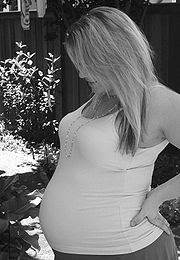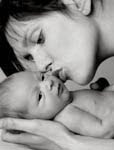
The third trimester of your pregnancy is one of the most tiresome, yet joyous times of your life as a woman. You’ll begin to really feel that the baby is about to become part of your life. This is also generally the time that your partner and other children, if present, will also build more of a bond with the baby.
Your baby is pretty much fully developed by this point, and is only gaining size and weight to become strong and healthy. The brain does more development during this stage, and the lungs also begin to practice for taking that first breath. As the baby runs out of room, movement will be felt more strongly, but less frequently. Often, you’ll feel little or no movement for the last week as the baby prepares for its birth.
As the baby grows, you’ll feel more pressure on your bladder, and later on your legs and pelvis as well. You may also have more back pain as your baby and abdomen grow, until the baby drops and the weight shifts to your pelvis and legs. This discomfort can become tiresome, and many women start to wish that the baby would come already. Just do your best to get plenty of rest and don’t stay on your feet for long periods of time. Concentrate on having a healthy baby and the joys you’ll soon experience as a mother. Pregnancy will be over soon enough!
Around this time, you should stop lifting other children, if possible, and take it easy. There’s relatively little you could do to injure the baby at this point, but you yourself are in a delicate state. With the strain put on your body by carrying the baby as it becomes larger, you’ll need to be extra careful that you don’t injure .
Most women have their baby shower during the third trimester. By this time, you’ll know exactly what you have and what you need. Based on sonograms, you’ll probably also know the sex of your baby, as well as its approximate birth weight and length as estimated by your doctor.
If you already have everything you need, ask for diapers – you can never have enough diapers!
If you haven’t done so already, you need to begin making plans and alternate plans for getting to the hospital when the time comes. Make sure you have more than one route to the hospital planned, and that every possible driver knows these routes well. Do a couple of practice runs and keep a bag ready at all times by the door. You never know when labor will begin.
Overall, your final trimester is a great time in your pregnancy. You’ve made it through the worst trials of the first and second trimesters and all your preparations have been made. You know that your baby is growing strong and healthy, and can feel him move often as he runs out of space. Now, you can simply sit back and await the final moment when you’ll become a mother.
Third Third Trimester of Pregnancy – Week by Week
You’ve finally made it through the nausea and fatigue of the first trimester and the busy nesting of the second trimester. Now it’s time to sit back and relax and await the coming of your baby. But as this last trimester of your pregnancy passes, you may have many questions about what pain and discomfort is normal and what may present a problem that you need to discuss with your doctor.
Throughout the first two trimesters, you likely saw your doctor once per month or every four weeks. This is true of most pregnancies, unless there are complications or risk factors present. During the third trimester of pregnancy, you’ll likely see your doctor once every two weeks until four weeks before your due date, when visits will be scheduled once each week. The increased visits are to ensure that the baby is developing normally and that you’re staying healthy. It also gives the doctor a chance to monitor how things are coming along, and if there’s any chance of a premature birth.
Week twenty-seven and twenty-eight will bring more development for the brain and lungs for your baby. You’ll also experience some breathlessness as the baby grows and your abdomen pushes toward your lungs. By the end of this time, your baby will have developed enough to be able to hear sounds from within the womb.
By week thirty-one, your baby can easily survive a premature birth. Most of its internal development is complete, and it will now only be gaining weight and size and becoming stronger and healthier. The baby will shed its first layer of hair, start blinking and begin preparations for entering the world at this time.
The rest of your trimester will be a trial. The baby will continue to grow in size and weight, putting pressure on your abdomen, your back and possibly your lungs. You’ll have to urinate much more frequently and you’ll begin to feel very tired and cranky.
In week thirty-six, if not sooner, your baby will drop into position to enter the birth canal. This will give you some relief in your lungs and chest, but will make things much worse for you in the pelvic region. You may also start to experience some cramping in your legs as the baby pushes down on your lower regions. Try to stay off of your feet as much as possible at this time.
In week thirty-eight, your doctor may perform one last sonogram to ensure that the baby is the proper position in the birth canal. There are many measures that can be taken if your baby is in the breech position. The baby’s position may be changed by pushing and prodding the outside the womb through your abdomen. If this isn’t possible, arrangements can be made for a caesarean birth. This is much easier to handle if it’s known before you go into labor.
By week thirty-nine, your baby should be at least seven pounds, give or take. Some babies will be larger and others smaller. Your baby could come at any time, so be prepared! Head for the hospital if your water breaks, you have a sudden, constant leak of fluid as if your water is broken or if you have contractions no more than five minutes apart consistently for one hour or more. Any one of these clues could be present to let you know that you’re in labor and it’s time for the baby to be born.



